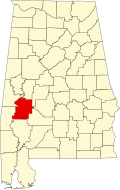2020 census
As of the census of 2000, there were 383 people, 163 households, and 105 families residing in the town. The population density was 190.3 inhabitants per square mile (73.5/km2). There were 212 housing units at an average density of 105.3 per square mile (40.7/km2). The racial makeup of the town was 50.13% Black or African American, 48.56% White, and 1.31% from two or more races. 2.35% of the population were Hispanic or Latino of any race.
There were 163 households, out of which 27.0% had children under the age of 18 living with them, 39.9% were married couples living together, 23.3% had a female householder with no husband present, and 35.0% were non-families. 33.7% of all households were made up of individuals, and 25.2% had someone living alone who was 65 years of age or older. The average household size was 2.35 and the average family size was 3.01.
In the town, the population was spread out, with 24.0% under the age of 18, 9.4% from 18 to 24, 24.0% from 25 to 44, 20.6% from 45 to 64, and 21.9% who were 65 years of age or older. The median age was 40 years. For every 100 females, there were 79.0 males. For every 100 females age 18 and over, there were 69.2 males.
The median income for a household in the town was $25,972, and the median income for a family was $31,250. Males had a median income of $32,404 versus $21,750 for females. The per capita income for the town was $13,390. About 22.1% of families and 29.2% of the population were below the poverty line, including 43.2% of those under age 18 and 33.8% of those age 65 or over.



